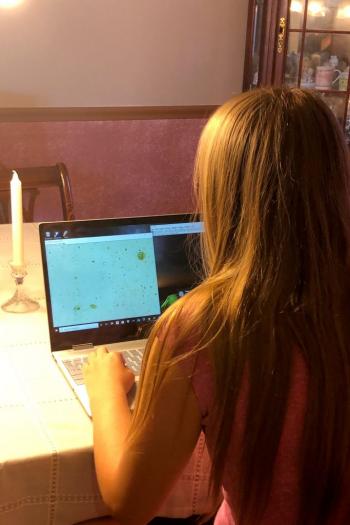
The Virtual Sand Dune of a Remote Research Experience
Courtesy of Kellogg Biological Station. View the original article at http://www.kbs.msu.edu/2020/09/sydney-hall-reu2/.
Last summer, I wrote a blog post comparing the difficulties of research to climbing a sand dune I climbed while I was at KBS. This summer, as for most people, has been a different type of sand dune all together. Amidst the COVID-19 pandemic, it seemed like everyone’s internship opportunities were being canceled or going remote. I felt lucky to continue my research at KBS this summer, albeit remotely instead of in-person. However, as for most things, there were difficulties that made up my virtual sand dune.
This summer, I worked with Dr. Litchman in her lab researching how the size of phytoplankton is related to various environmental factors, including zooplankton abundance, availability of nutrition, and abundance of other phytoplankton. It might seem impossible for people to have a research experience remotely, but with the help of software, project ideas from my mentor and a lot of appreciated help from lab techs Allyson Hutchens and Pam Woodruff, it was possible.
Despite the changes this year, I approached this summer with more confidence due to my REU experience at KBS last summer. I thought I wouldn’t have to face the same struggles that resembled a Michigan sand dune, like the previous summer. However, all of the things that I had previously learned how to do in the physical lab were no longer useful during this COVID-19 summer. Not only that, but I was not working with marine phytoplankton anymore but with freshwater phytoplankton.
An invigorating climb
You never know how tall a sand dune really is when you start your climb at the bottom. Similarly, I didn’t realize the different challenges that I would face while researching from home instead of at the lab. At first, it seemed so simple to say I would do measurements and then analyze data, but when I actually opened the computer to start, I realized it was much more difficult than I thought and that there is much more to it than measuring.
Computer generated imagery used in phytoplankton research.Some days were like walking on a plateau part of the dune. Everything was going right, I was measuring phytoplankton, grouping the data and getting analysis. I was able to connect everything in my mind and determine what to do next. Some days I was at the steepest part of the virtual sand dune. There would be literal virtual issues, where my Wi-Fi would crash and my software would glitch. Then I would hit a wall when it came to the next step of analysis. Even when I knew the end goals; to determine how different environmental factors affected species sizes, it is hard to comprehend all of the minuscule steps it takes to get there—Just like how you do not realize truly how many steps it takes to get up a sand dune until you have taken all of them.
However dire it may have seemed or felt I was always able to continue. I asked my mentor many, many questions, and she always took it upon herself to answer them to the fullest. Sometimes YouTube tutorials on how to use software like Image J and JMP were also helpful when the issue was technical. Overall, I realized that problems just needed to be looked at as an opportunity to learn and to problem-solve instead of a wall, or a dune that is impossible to climb.
Most importantly, however, the experience was like a virtual sand dune because I ended with the same feelings I did when I reached the top of the real sand dune. I felt a sense of accomplishment in my ability to learn more about the aquatic system, phytoplankton, what it means to do research and how to figure out the day-to-day problems on my own. I still felt my experience last summer helped boost me up, but I also understand now that there is always more to learn. I want to continue to learn about the world, knowing that the mountains I have to climb to get there are worth it.
~~~~~~~~~~~~~~~~~~~~
Sydney Hall recently completed her second summer in the Research Opportunities for Undergraduates–REU–program at KBS. Her mentor is Dr. Elena Litchman.
~~~~~~~~~~~~~~~~~~~~


.jpg)

.jpg)
.jpg)

